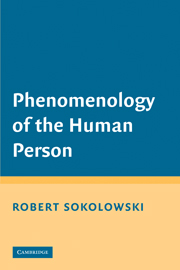Book contents
- Frontmatter
- Contents
- Acknowledgments
- Phenomenology of the Human Person
- Introduction
- PART I THE FORM OF THINKING
- 1 Two Ways of Saying “I”
- 2 Further Kinds of Declaratives
- 3 Linguistic Syntax and Human Reason
- 4 The Person as the Agent of Syntax
- 5 Reason as Public
- 6 Grammatical Signals and Veracity
- PART II THE CONTENT OF THINKING
- PART III THE BODY AND HUMAN ACTION
- PART IV ANCIENTS AND MODERNS
- 19 Conclusion, with Henry James
- Bibliography
- Index
2 - Further Kinds of Declaratives
Published online by Cambridge University Press: 05 June 2012
- Frontmatter
- Contents
- Acknowledgments
- Phenomenology of the Human Person
- Introduction
- PART I THE FORM OF THINKING
- 1 Two Ways of Saying “I”
- 2 Further Kinds of Declaratives
- 3 Linguistic Syntax and Human Reason
- 4 The Person as the Agent of Syntax
- 5 Reason as Public
- 6 Grammatical Signals and Veracity
- PART II THE CONTENT OF THINKING
- PART III THE BODY AND HUMAN ACTION
- PART IV ANCIENTS AND MODERNS
- 19 Conclusion, with Henry James
- Bibliography
- Index
Summary
The achievement of truth defines us as human beings, and it is not limited to our purely cognitional activities. It is involved in how we want things and in how we act, and declaratives also function in these other ways of being rational.
Emotive Declarations and Truth
We have focused on the relationship between declarative speech and cognitive terms like see, know, and suspect, but we can also speak declaratively when we say things like “I love (or hate) you,” “I sympathize with you in your troubles,” “I have confidence in you,” or “I am angry with those people.” In these statements also we express ourselves as exercising our reason at the moment when we say the words, but these phrases may seem at first glance to express emotive attitudes rather than cognitive states. The appearance is deceptive, however, because a human emotive state incorporates an opinion and is therefore an exercise of reason: if I am angry, it is because I believe that I or someone related to me has been insulted or dealt with unjustly, and if I hate someone, it is because I think that the person ought to be hated. If I have confidence in someone, it is because I judge the person to be trustworthy. Affective attitudes have an opinion built into them. My opinion may be wrong – often enough, under the pressure of emotion, we form incorrect judgments – but it still is an opinion, and it provides the basis for my affectivity.
- Type
- Chapter
- Information
- Phenomenology of the Human Person , pp. 22 - 30Publisher: Cambridge University PressPrint publication year: 2008



